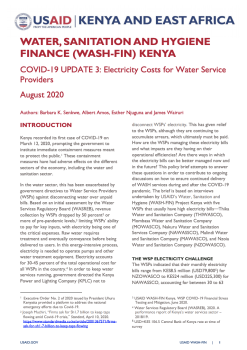Kenya recorded its first case of COVID-19 on March 12, 2020, prompting the government to institute immediate containment measures meant to protect the public. These containment measures have had adverse effects on the different sectors of the economy, including the water and sanitation sector. In the water sector, this has been exacerbated by government directives to Water Service Providers (WSPs) against disconnecting water over unpaid bills. Based on an initial assessment by the Water Services Regulatory Board (WASREB), revenue collection by WSPs dropped by 50 percent or more of pre-pandemic levels, limiting WSPs’ ability to pay for key inputs, with electricity being one of the critical expenses.
In order to keep water services running, government directed the Kenya Power and Lighting Company (KPLC) not to disconnect WSPs’ electricity. How are the WSPs managing these electricity bills and what impacts are they having on their operational efficiencies? Are there ways in which the electricity bills can be better managed now and in the future? This policy brief attempts to answer these questions in order to contribute to ongoing discussions on how to ensure continued delivery of WASH services during and after the COVID-19 pandemic.


